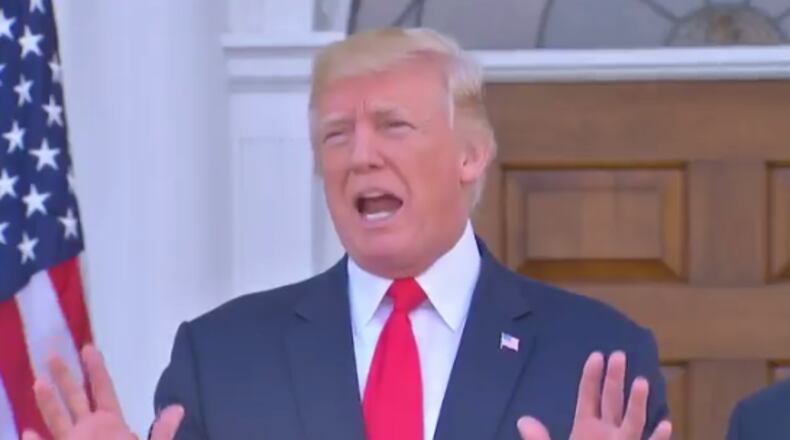President Donald Trump goes Wednesday to Springfield, Missouri to accelerate his administration's push for tax reform, amid ongoing questions as to whether Republicans in Congress can get something done in coming months on the subject, as lawmakers in both parties await the details of a GOP tax plan.
"We're committed to passing the first major tax reform in over thirty years," the President said to cheers last week at a rally in Phoenix, Arizona.
But on Capitol Hill, getting something done this year would be considered a long shot at best.
Where does tax reform stand at this point?
1. Don't expect details today from President Trump. The White House on Tuesday made clear to reporters that this is a speech to generate support for tax reform, but that Mr. Trump will continue to avoid anything but broad themes on why tax reform is important for American businesses and taxpayers. "This is going to be a speech focused on why we need tax reform, not necessarily how we are going to have tax reform legislation look," a senior White House official said in a conference call with reporters. So, when you hear the President talk about providing people with the 'the biggest tax cut ever," that sounds great, but remember - there is no Trump tax cut bill. There is no GOP tax reform bill. It's all still on the drawing board, and it's not clear when an actual piece of legislation will be made public. To have a vote, you need a bill.
2. Is this going to be a tax cut or tax reform? After the GOP health care debacle, many on Capitol Hill aren't sure that Republicans can really get anything approved on tax reform - with some wondering whether the House and Senate will pull back and just try to pass a plain tax cut. But as I mentioned above, while there is a lot of talk of what the President wants to do - and what GOP leaders in the Congress would like to achieve - there are a lot of details and blanks that must be filled in on taxes. This is not a simple, one page measure by any means. When you argue for things like 'lower rates' and a 'simpler' tax code, that can mean a lot of different things to different people. As someone smart told me many years ago about a proposal in Congress on taxes, "What the big print giveth, the little print taketh away."
3. Tax reform does not top the September GOP agenda. With all of the legislative items that must be addressed in September - the debt limit, averting a government shutdown, health care, and more, it's hard to see how tax reform can get a big jolt of momentum after Labor Day. Also, GOP lawmakers aren't too pleased about how the month of August has evolved - they had hoped that Mr. Trump would spend much of his energy (while Congress was away) on efforts to promote his legislative agenda - making speeches about tax reform and other major issues. But it's been anything but that type of month for Mr. Trump, and Congressional Republicans have noticed. "I think the President has gotten off message too often, and hasn't been able to be an effective spokesman for his own agenda," said Sen. Pat Toomey (R-PA).
4. Are we really going to a postcard for tax filing? Over and over, we hear the drumbeat from top Republicans in the Congress - they not only want to lower your taxes, but they want to make it easier to 'do your taxes.' GOP lawmakers often talk about reducing all the forms into one, easy to fill out postcard. But if that's going to happen, then all sorts of write offs and deductions would have to be eliminated - and that will not be an easy lift. It might sound easy to do - but in order to streamline deductions like that for mortgage interest, and other popular items, some difficult decisions have to be made along the way about how the tax code will change. And that will mean there are real winners and real losers.
5. There are all sorts of options on taxes. When President Reagan started the push for tax reform in 1985, he gave Congress a 489 page document that spelled out his tax plans in great detail. So far, President Trump has offered up one page of bullet points. Do you want to raise the standard deduction and not allow people to itemize their taxes? Scale back the number of rates? Chop out huge sections of the tax code? Change how small business income is dealt with? How investment income is treated? The list is almost endless. But one thing seems true to me - if the President does not indicate what he wants done, that will make Congress more tentative about the details. They don't want to go out on a limb to do something like limiting the mortgage interest deduction, only to have the President say that he won't support such a plan. Stay tuned.
About the Author
The Latest
Featured



